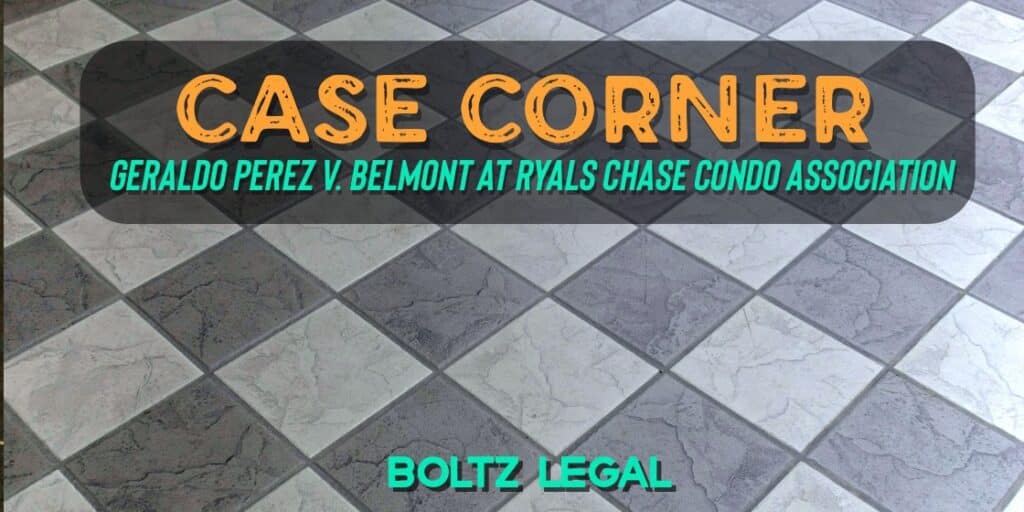A Landlord’s Duty to Repair Dangerous Flooring
49 Fla. L. Weekly D1939a
Landlord-Tenant – Torts – Premises Liability – Trip and Fall – Post-possession Duty
2nd District Court of Appeal, September 25, 2024
Case No. 2D2023-0872
Judge: Kemba Lewis
Background
Geraldo Perez rented an apartment from Belmont at Ryals Chase Condominium Association, with the unit being managed by Webb Realty Consultants. Perez’s lease specifically noted that Belmont was responsible for the maintenance and repairs of certain parts of the unit, including the floors. While living in the apartment, Perez noticed that the floor tiles near the entrance had become loose. Since this was the only entrance to the unit, Perez was forced to walk across these unstable tiles regularly. Perez’s wife notified both Belmont and Webb Realty Consultants about this dangerous condition on two separate occasions. However, the issue was not fixed, and Perez ultimately suffered injuries from a fall on these loose tiles.
Perez subsequently filed a negligence suit against Belmont and Webb, arguing that they failed to maintain the floor in a safe condition. In response, Belmont and Webb filed a motion for summary judgment, contending that they were not liable because the dangerous condition was “open and obvious,” and Perez was aware of the loose tiles before the fall. The trial court granted this motion, concluding that Belmont and Webb did not have a duty to Perez under these circumstances.
Appeal and Legal Arguments
Perez appealed the trial court’s ruling, arguing that it misinterpreted Florida law by holding that Belmont and Webb’s duty to maintain the flooring was eliminated because Perez was aware of the condition or that it was open and obvious.
The court examined the case using a de novo review standard, meaning it reviewed the trial court’s decision from the beginning without giving any weight to the previous judgment. Under Florida Rule of Civil Procedure 1.510(a), summary judgment is only granted if there is no genuine dispute regarding any material fact and if the moving party is entitled to judgment as a matter of law. Since Perez did not claim that any material facts were disputed, the appeal focused solely on whether Belmont and Webb were legally entitled to summary judgment.
The Court’s Analysis: A Landlord’s Post-possession Duty
A landlord’s duty to a tenant is generally divided into two phases:
- Prepossession Duty: Before the tenant takes possession, the landlord must ensure the premises are reasonably safe and repaired.
- Postpossession Duty: After the tenant takes possession, the landlord has an ongoing duty to repair dangerous defective conditions if notified by the tenant.
In this case, Perez argued that the loose floor tiles constituted a dangerous condition and that Belmont and Webb were notified of this condition before his fall. Given that these tiles were at the sole entrance to the unit, the likelihood of injury was increased because Perez had no alternate way to access his apartment.
The trial court previously ruled that Belmont and Webb’s duty was limited to conditions that were “inherently unsafe” or not readily apparent to Perez, and since Perez was aware of the loose tiles, they owed him no duty. However, the appellate court disagreed with this interpretation. The key issue was that Belmont and Webb were notified about the dangerous condition by Perez, triggering their duty to repair the tiles regardless of whether the condition was open or obvious.
Clarification of the Law
The court noted that the trial court’s ruling was based on a misinterpretation of Youngblood v. Pasadena at Pembroke Lakes South, Ltd., which was not relevant to the circumstances in Perez’s case. In Youngblood, a tenant was injured by a loose towel rack that had never been reported to the landlord, and the court found that the landlord was not liable since the rack was not a dangerous condition. However, in Perez’s situation, he provided explicit notice to the landlord about the loose tiles, which created a dangerous condition, thus triggering the landlord’s duty to repair.
The court also referenced Menendez v. The Palms West Condominium Ass’n, which dealt with a landlord’s prepossession duty to repair dangerous conditions that are not readily apparent to the tenant. However, this prepossession duty did not apply to Perez’s case, which concerned a postpossession duty triggered by the tenant’s notification of the dangerous condition.
The court clarified that once a tenant provides notice of a dangerous condition, the landlord has a duty to repair, and this duty is not negated just because the tenant is aware of the danger. Requiring tenants to notify landlords of dangerous conditions, only for landlords to then avoid responsibility based on the tenant’s awareness, would effectively shield landlords from liability, contradicting established legal principles.
The court concluded that Belmont and Webb had a continuing duty to repair the loose tiles because they were a dangerous condition, and Perez’s wife had twice notified them of the issue before the fall. The lease further restricted Perez from making alterations or repairs without written consent from Belmont, making it Belmont and Webb’s sole responsibility to address the flooring issue.
Therefore, the trial court erred in granting summary judgment in favor of Belmont and Webb. The 2nd District Court of Appeal reversed the decision and remanded the case for further proceedings.
Today’s Insight:
“An ounce of prevention is worth a pound of cure.”
— Benjamin Franklin

